Aug 29, 2024 – Meeting with White Helmets Activists, Traveling to Bhutan
Hello. Today, we are meeting with White Helmets activists to discuss future plans for the Turkey-Syria earthquake recovery project, and then traveling to Bhutan.
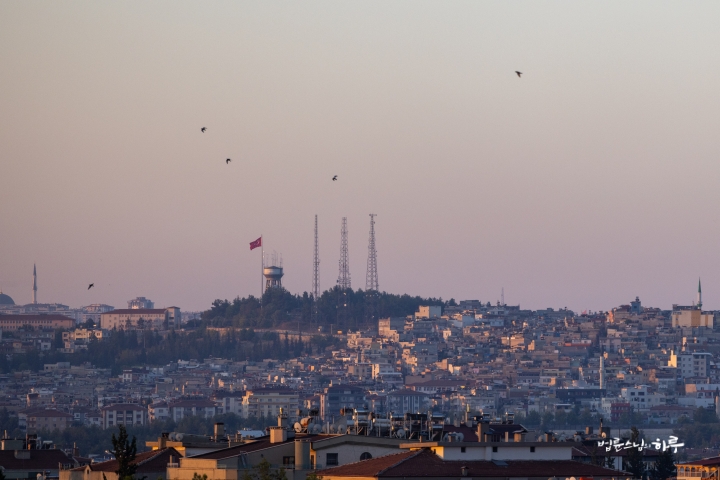
After completing his morning practice and meditation, Sunim had breakfast at his accommodation and then headed to the office where the White Helmets members work.
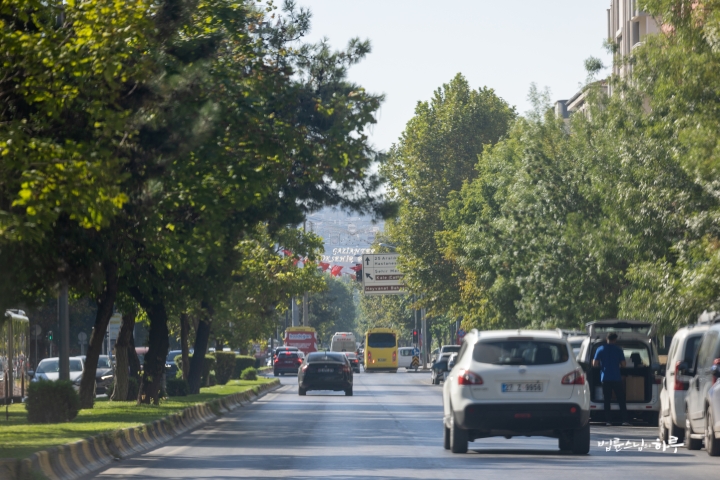
The official name of the White Helmets is the Syrian Civil Defence. Initially, they started as a volunteer fire brigade organized by residents to extinguish fires caused by bombings and rescue buried people in war-torn villages. Now, they have grown into a civil defense force with a certain level of expertise.
At 9 AM, we arrived at the White Helmets office. The activists warmly welcomed Sunim.
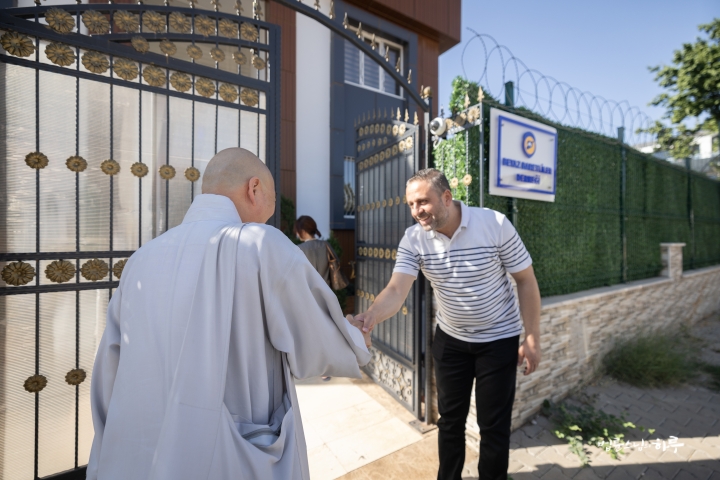
Since the Turkey-Syria earthquake in February last year, JTS has been collaborating with the White Helmets on earthquake recovery projects for over a year. The largest project is the reconstruction of a collapsed school that 4,000 students attended.
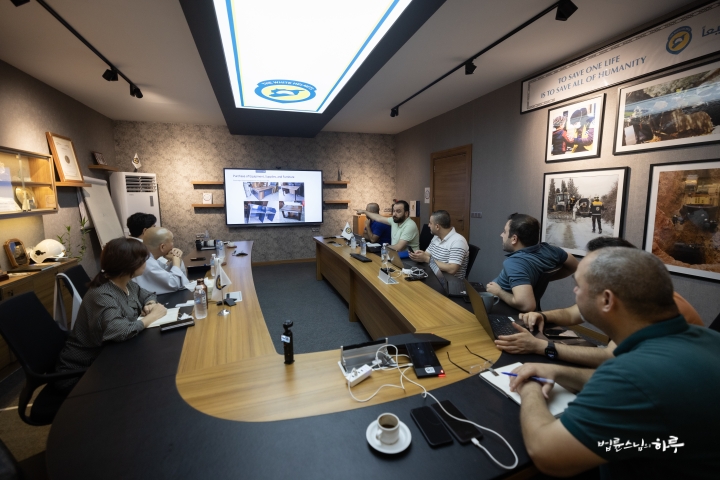
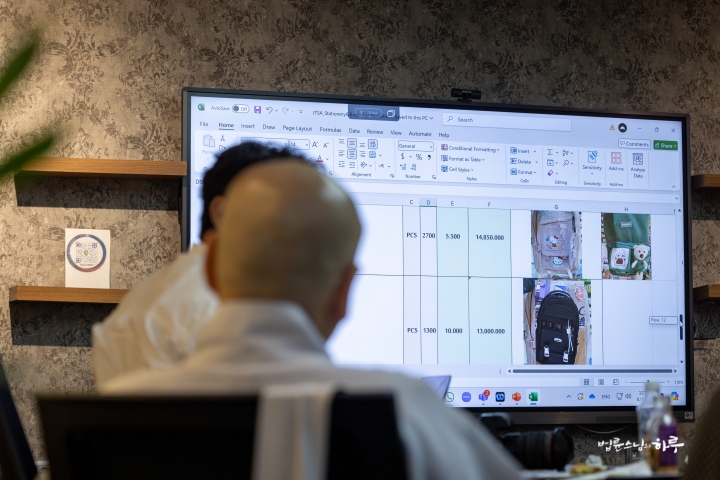
First, the White Helmets reported on the progress of the school construction over the past year. After receiving a detailed report on what processes have been completed and what remains to be done, we discussed when to set the date for the completion ceremony. Sunim advised against rushing the construction unnecessarily.
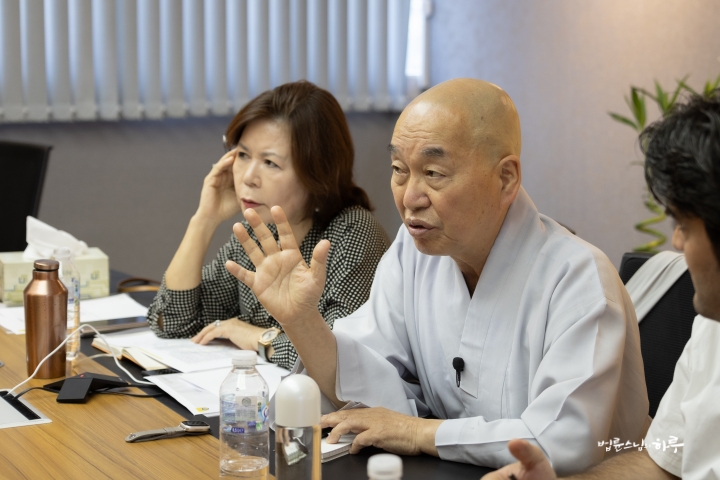
“Safety is the most important thing, so don’t rush the construction to meet the completion ceremony date. If there’s not enough time for construction, we can postpone the ceremony by a month.”
The White Helmets members confidently replied.
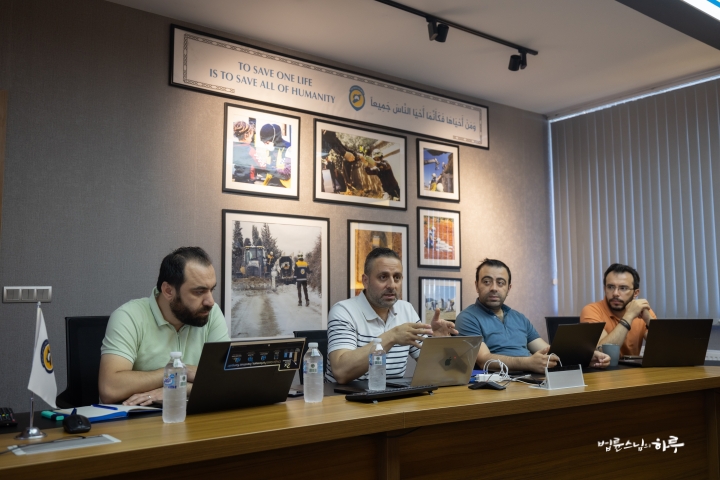
“There’s no problem finishing the construction by October 9th, the originally planned completion ceremony date. We can easily finish any remaining work by deploying more White Helmets members. Since you’re concerned, we’ll have all the White Helmets members gather in a few days to do a final check and then confirm the completion ceremony date again.”
After agreeing to confirm the completion ceremony date later, we continued discussing the ceremony program. First, Sunim suggested programs that should definitely be included in the ceremony.
Overcoming the Pain of War and Earthquake, Towards a New Future
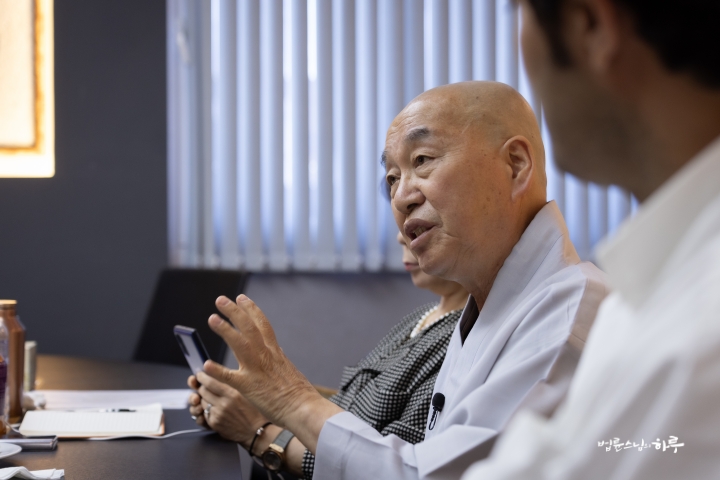
“First, it would be good to have a time to commemorate the teachers and students who were sacrificed in the earthquake. Then, we need a progress report on how the school was completed. After the ceremony, it would be nice to have a tour of the school classrooms with the attending guests. In Islam, is there a blessing ceremony like sprinkling water as in Buddhism or Catholicism?”
“There’s no such blessing ceremony in Islam. But how about if you give a blessing, Sunim?”
“No, if there’s no such culture, I don’t need to give a blessing. Please just include the three things I mentioned above in the ceremony program, and I’ll leave the rest of the programs entirely up to you. Above all, it would be good to first decide what the main theme of the completion ceremony should be and plan the event around that.
‘We’ve been through war, suffered earthquake damage, and endured many hardships, but just as this school has been newly constructed, we can overcome our current difficulties and move towards a new future. So let’s have hope!’
I think it would be good to focus the overall content of the school completion ceremony on this. I hope that the people attending the ceremony can have hope and not be discouraged by reality. Just as we’ve built this new school building on land that was devastated by the earthquake, I hope we can prepare the event so that people can feel that we can create a new future despite our current difficulties.”
“We understand well. We have the same thoughts. We’re also planning to have children prepare plays or songs on the theme of hope. We’ll prepare the event so that people can gain new courage and hope through the completion ceremony, despite having endured war for the past 13 years and suffered earthquake damage.”
Sunim then repeatedly emphasized the importance of emergency evacuation drills.
“We need to do a lot of fire drills where children actually practice how to move quickly to evacuate in emergency situations like earthquakes, bombings, or fires. In a single-story building, you just need to go outside, but this school is a tall building with complex corridors, so if not done properly, children might get confused and injured while trying to evacuate. So we need to make sure children are familiar with emergency exit routes and evacuation plans. Most of the houses where children live are single-story buildings, so they have no experience staying in buildings like this. That’s why emergency evacuation drills are absolutely necessary.
“Yes, we understand.”
After discussing the school completion ceremony, we moved on to discuss how to solve the education problem for children in the widespread refugee camps in northern Syria.
First, the White Helmets gave a general briefing on the education situation after the war and earthquake damage.
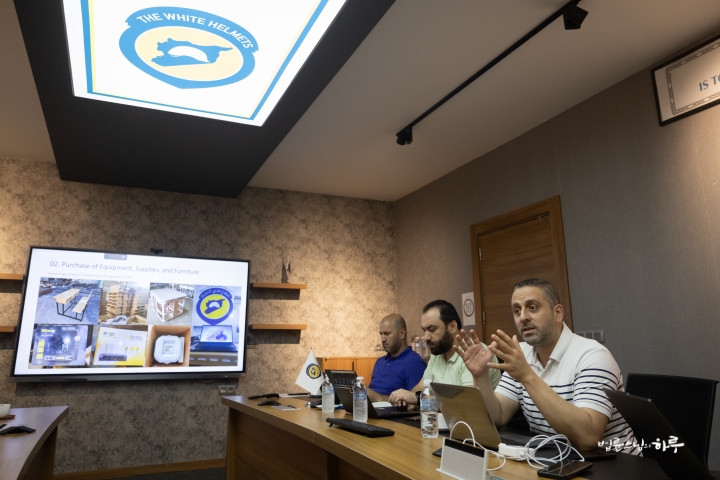
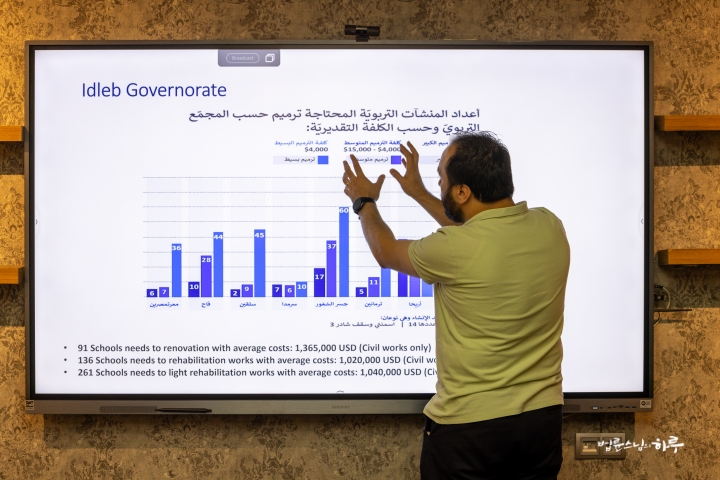
“Currently, 49% of all schools have been damaged by bombings or war, and 19% need repairs due to severe deterioration from lack of maintenance. And 16% have been damaged by earthquakes. According to INEE (Inter-agency Network for Education in Emergencies) statistics, 88% of schools need facility improvements. There are no storage rooms or lockers, making it difficult to store books. The school buildings only have classrooms, with no other facilities at all.”
After listening to the briefing, Sunim asked another question.
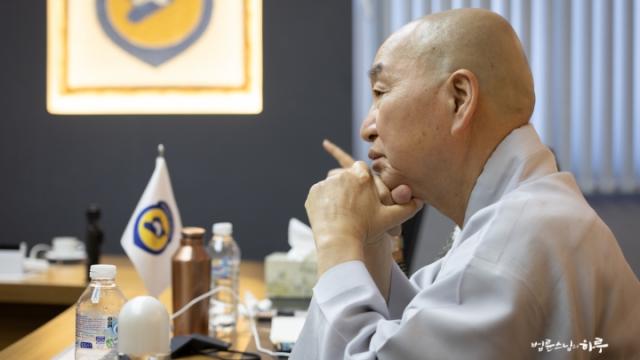
Currently, 500,000 Children Are Unable to Attend School
“I’m curious if all existing schools were to operate normally, would they be able to provide educational opportunities not only for the children who originally attended school but also for the children of refugees? Even if all the damaged schools are repaired, do refugee children still need additional new schools regardless?”
A White Helmets activist responsible for education responded:
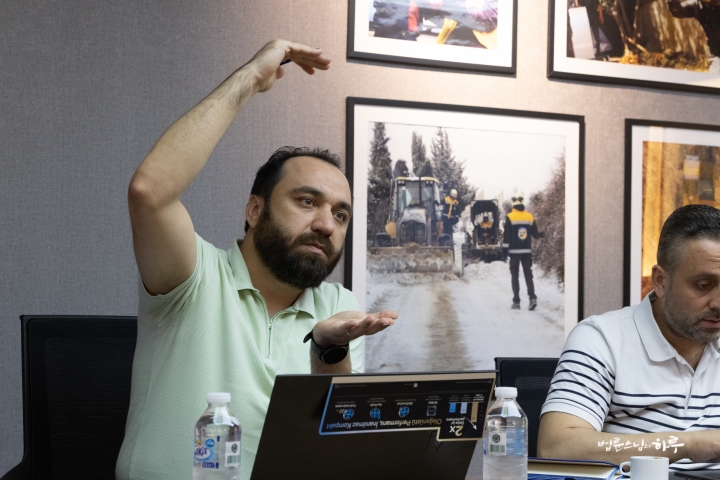
“Yes, that’s correct. Repairing school facilities only benefits the children who originally lived here. According to UN statistics, the 13-year war and recent earthquake damage have created 3.5 million refugees in northern Syria alone. Schools are operating at full capacity with morning and afternoon sessions, but they cannot accommodate refugee children. Even if all schools are repaired, 500,000 refugee children will not be able to attend school due to a lack of classrooms.”
“In that case, we should at least open temporary tent schools for the 500,000 children in refugee camps to provide basic education so they can read and do basic arithmetic. This will allow them to engage in small businesses to make a living.
So we need to prioritize whether to invest first in operating temporary tent schools for 500,000 refugee children or in repairing and renovating schools for 1 million children. In my opinion, the most urgent need is to open even six-month tent schools for the 500,000 refugee children who are currently receiving no education, to eradicate illiteracy first.”
The White Helmets members listened attentively to Sunim’s words. Sunim proposed a national movement for Syrians to take the initiative in eradicating illiteracy among their people.
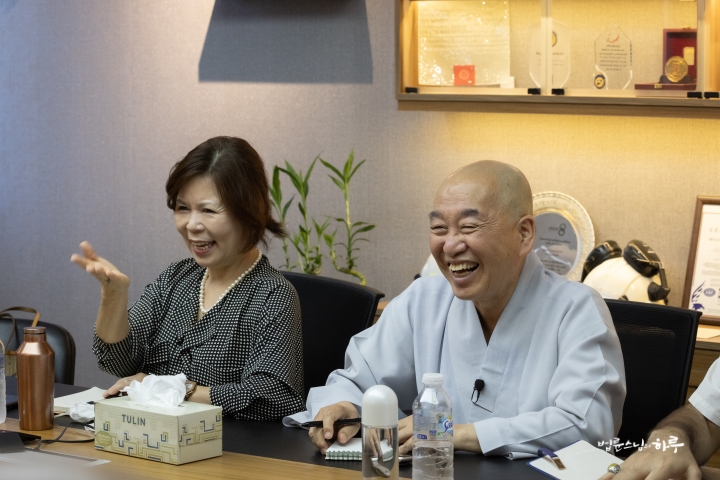
“First, we need to establish priorities to address the education problem. The first phase should involve widely spreading temporary tent schools that teach basic literacy and simple arithmetic to anyone who can’t read or write, regardless of age, whether children or adults. This nationwide literacy program should be implemented for 6 months to a year. The second phase is to have children attend elementary school. While the temporary tent schools in the first phase only teach basic literacy without general knowledge education, graduating from these tent schools and attending elementary school allows students to learn subjects like science, history, and music, which form the basis of general knowledge. The third phase is to provide access to middle school and beyond, which isn’t mandatory but should be available for those who wish to continue their education.
Let’s Eradicate Illiteracy Among Our Children Ourselves!
Since temporary tent schools only teach basic literacy and numeracy, there’s no need for highly qualified regular teachers. Anyone in Syria who has completed high school can teach. Therefore, we can easily recruit volunteer teachers for these temporary tent schools.
In such cases, JTS can provide support by setting up tents, supplying educational materials like blackboards and textbooks. JTS has been conducting many projects in various Southeast Asian countries through volunteer efforts. Similarly, it would be great to launch a national movement in Syria, encouraging citizens to volunteer their time. In simple terms, why not start a campaign saying, “Let’s eradicate illiteracy among our children ourselves”?
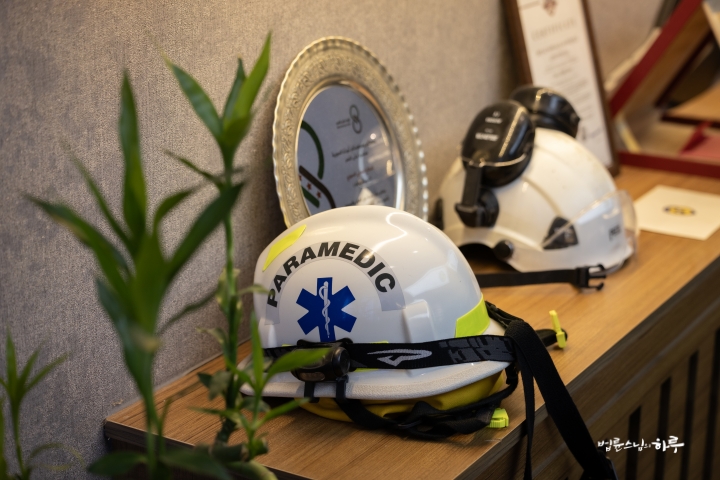
Currently, there are 500,000 children not attending school. If we create classes of 50 students each, we would need 10,000 tent schools. To complete this as quickly as possible, if we run two 6-month sessions, we would need 5,000 tents. This would also require 5,000 teachers, and paying salaries to all of them would be extremely costly. Therefore, my proposal is to operate tent schools with volunteers. The teachers don’t even need to be the same people every day.
By operating tent schools with volunteers, we only need to quickly secure 5,000 tents and the necessary educational materials. This way, we can solve the first phase within a year. Then we can move on to the elementary education phase. The idea is not to continue the first phase indefinitely, but to quickly solve the illiteracy problem within about a year and then transition to the second phase of elementary education.
To achieve this, all Syrians who have completed high school or higher education should participate as volunteers, teaching students for two hours a day, once or twice a week. Teaching basic reading, writing, and multiplication tables doesn’t require specialized knowledge, so we don’t need certified teachers from education colleges. We can launch a national movement to encourage all educated Syrians to participate in this project. JTS will provide the tents and educational materials needed for this.
If we estimate about a year for preparation and another year for implementation, we can solve the illiteracy problem for all Syrian people in roughly two years. Meanwhile, it’s necessary to simultaneously prepare for those who will advance to elementary school.
Trying to solve all of this with money alone would take far too long. We can’t afford to miss the critical timing for children’s education. With my proposal, we can achieve literacy for 500,000 people in a short time. Instead of relying on support from external NGOs, let’s launch a movement that involves all Syrian citizens to eradicate illiteracy among our children ourselves.
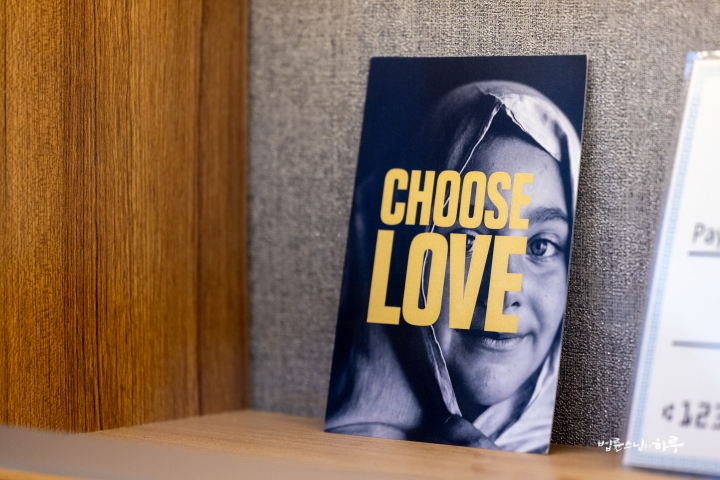
The simultaneous interpreter suddenly paused.
“Is the concept of a national movement unfamiliar in Syria? Why can’t you interpret?” (Laughter)
The interpreter’s eyes reddened. They resumed interpreting.
“No, it’s not that. I was momentarily considering how to convey your words because they were so moving.”
Sunim continued:
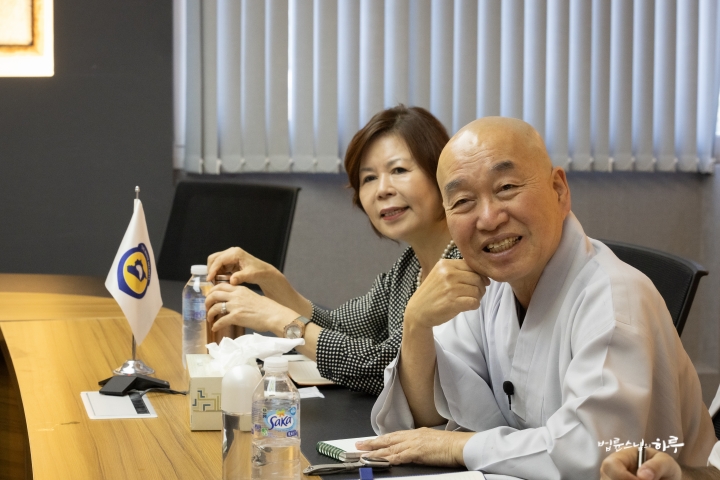
“I explained that there are 500,000 children who can’t attend school, but I think the actual number could be as high as 1 million. This is because we should include all those who couldn’t attend elementary school during the 13 years of war. In other words, it’s not just about children of current school age, but also about 20-year-old young adults who are past school age but still can’t read. They should all be targets for education.
However, completing the first phase of the program doesn’t take a long time. If we develop it as a national campaign to eradicate illiteracy, we can finish it within two years.
Making Literacy a National Movement for Syrians
While running these temporary programs, we need to prepare for the normal operation of elementary schools. If we focus solely on normalizing elementary schools, we risk abandoning the youth who have already missed their learning period. Above all, it’s impossible to build elementary schools for 500,000 students within two years. Therefore, we should address the urgent matters first while gradually expanding elementary schools.
To normalize elementary education quickly, we need to introduce an online system. It’s not feasible to train thousands of regular teachers or build thousands of standard schools in a short period. So, let’s normalize elementary education by simply installing online systems in existing schools. If it’s difficult to immediately set up internet networks nationwide, we can introduce Starlink, which uses satellite internet. With just the installation of equipment, internet access becomes possible anywhere. Once online classes are available, those who volunteered in temporary tent schools can simply manage students in elementary schools. Only one central school needs excellent teachers conducting formal classes, and that content can be broadcast online to 5,000 schools.
First, let’s make it possible for all Syrian citizens to read and write within two years. Second, let’s ensure that all Syrian citizens can graduate from elementary school. The idea is for JTS and White Helmets to be the catalyst to make this possible.
Of course, it won’t be easy. This task requires patriotism. Building structures is impossible without money. However, teaching our children is something we can do even without money because we have already learned. If there are no buildings, we can teach children under trees or in tents. Why do we need to keep asking foreigners for help with this?
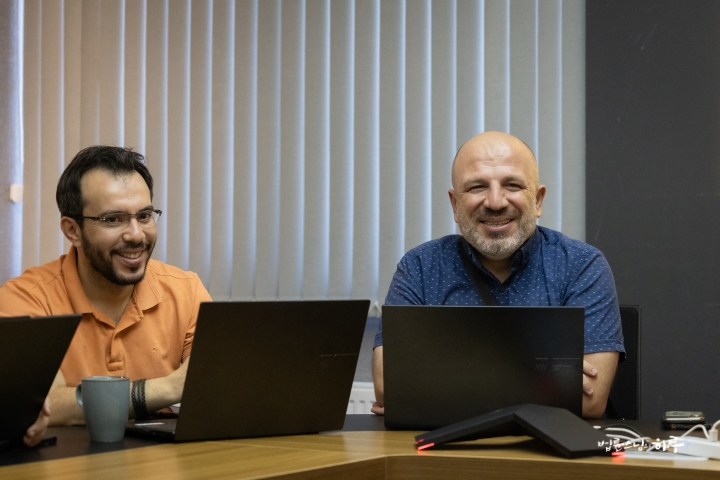
Let’s teach our children ourselves! We can teach our children to read and write in our language and do basic math calculations. The idea is to ensure that not a single child born on Syrian soil is left out of education.
When foreigners see this, they will be moved and suggest, “Can you really study like that under trees? We’ll provide tents,” or “Are tent schools enough? We’ll build school buildings for you.” When the international community is moved by our efforts and offers help, we’ll gain self-respect, and our children will develop pride.
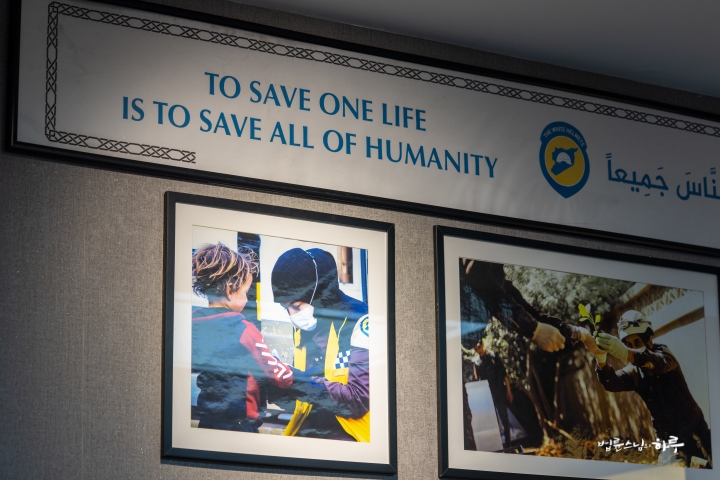
“I believe we need to completely change the mindset that ‘Education has collapsed because the international community isn’t helping.’ I’m speaking to you at length about this because solving the education problem is not the job of foreign NGOs, but something that Syrians themselves must do. We don’t need to ask others to teach our children; we can do it ourselves.”
After listening to Sunim’s proposal, the White Helmets representative responded:
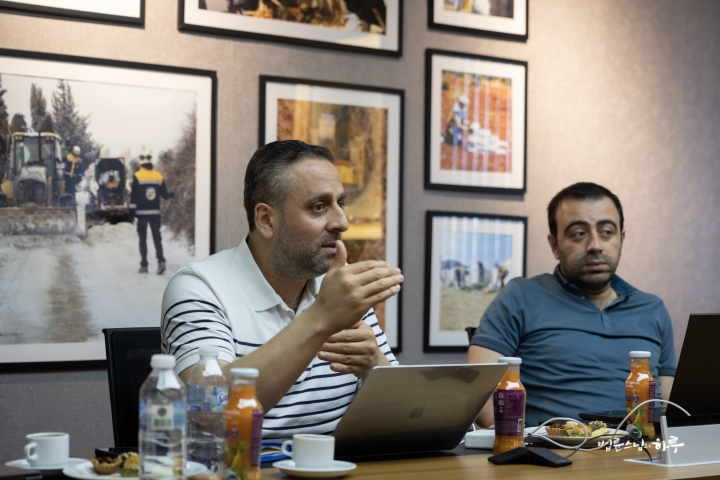
“Sunim’s proposal is a national project that would be difficult to achieve with just the cooperation of JTS and White Helmets. However, I think it’s an excellent idea. If we follow Sunim’s suggestion for at least two years, we can accomplish a lot. We want to create this together by encouraging all Syrian citizens to participate. Sunim’s proposal is like a revolution that will break through the ignorance of the Syrian people.”
It was agreed that when Sunim visits Gaziantep again next month, education officials would also participate to discuss this topic in more depth and develop concrete plans. The meeting concluded with this agreement.
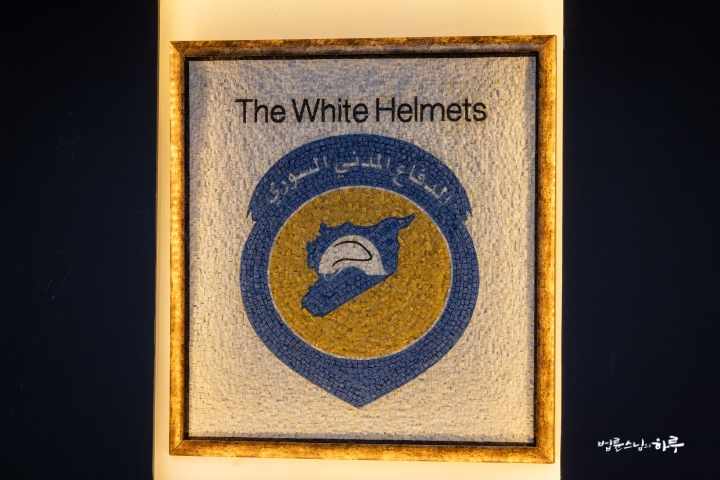
At 1:20 PM, the meeting wrapped up, and everyone shared lunch prepared by the White Helmets members. During the meal, the White Helmets members said:
“Sunim, thank you so much. We’ve received help from many organizations before, but it was always just receiving aid. You’re the first person who has considered how to make us the main actors. Your words have completely changed our mindset.”
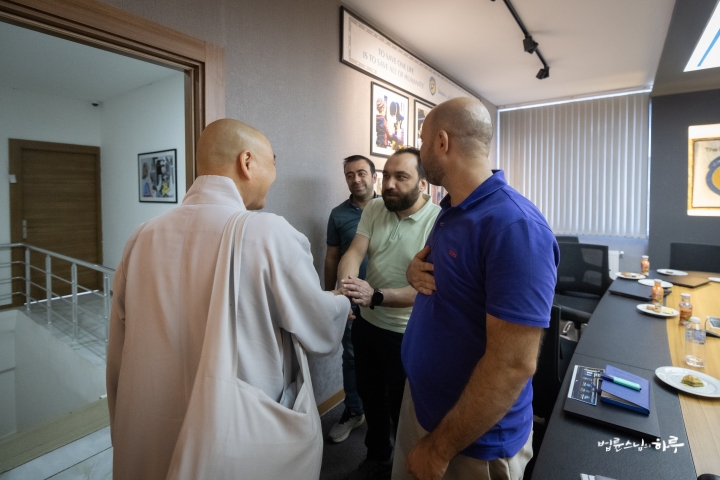
After expressing gratitude to Mr. Wahab for interpreting and taking commemorative photos, Sunim headed to Gaziantep Airport.
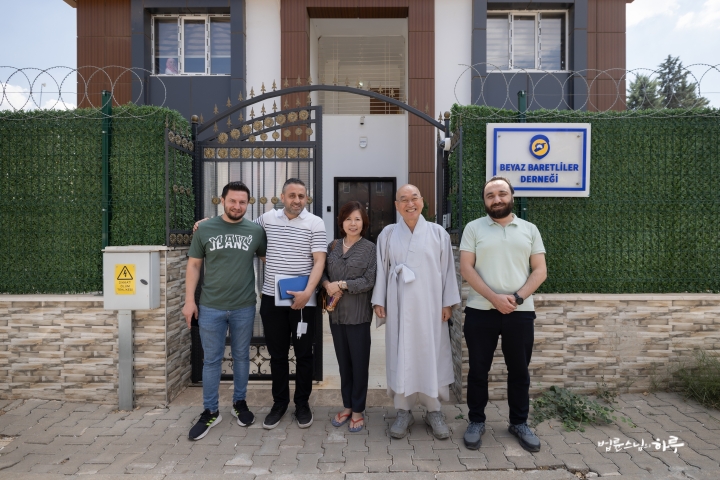
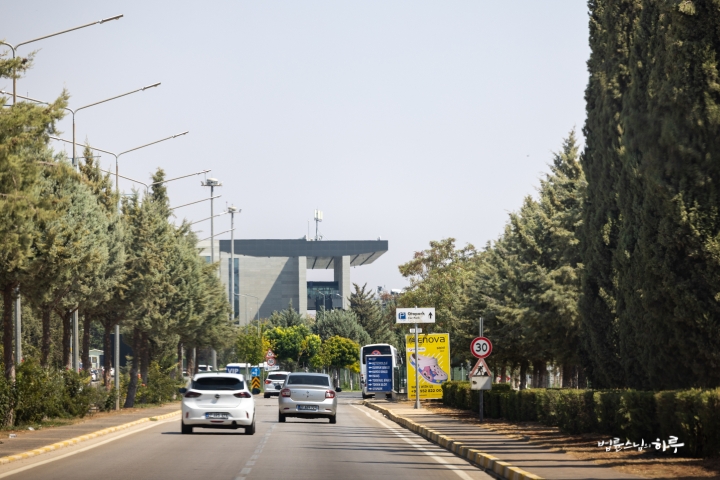
Arriving at the airport at 1:55 PM, Sunim completed the check-in process and boarded the plane.
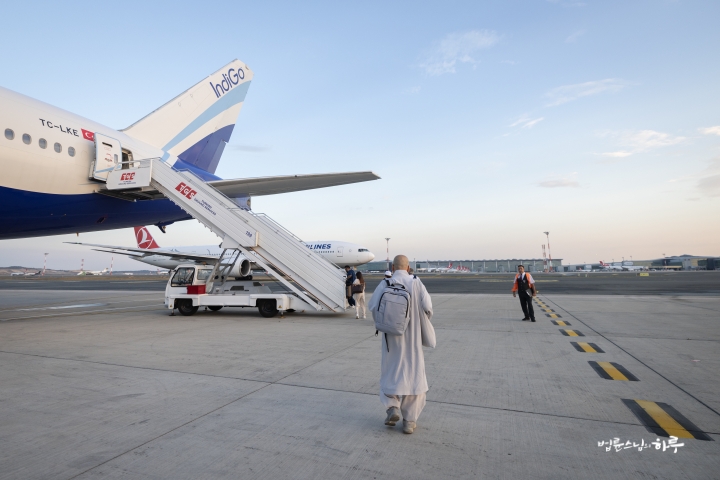
The plane departed from Gaziantep Airport at 3 PM and arrived at Istanbul Airport at 5 PM after a two-hour flight.
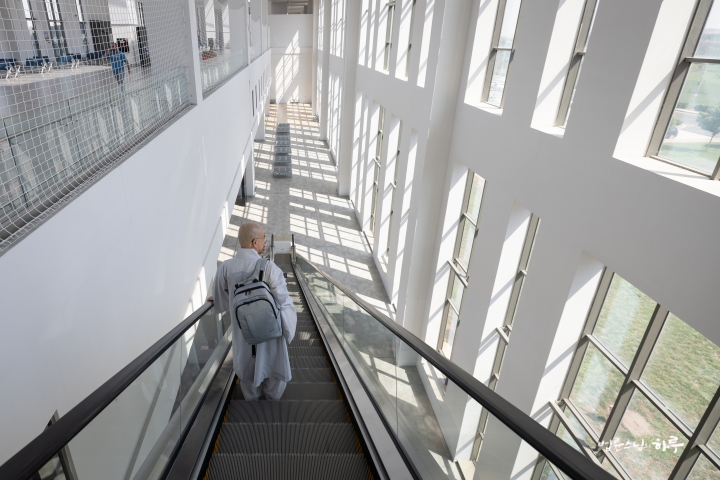
After checking in luggage and completing departure procedures, Sunim exchanged farewells with JTS representative Ms. Park Jina, who had accompanied him during the two-night, three-day field trip.
“Thank you for your hard work.”
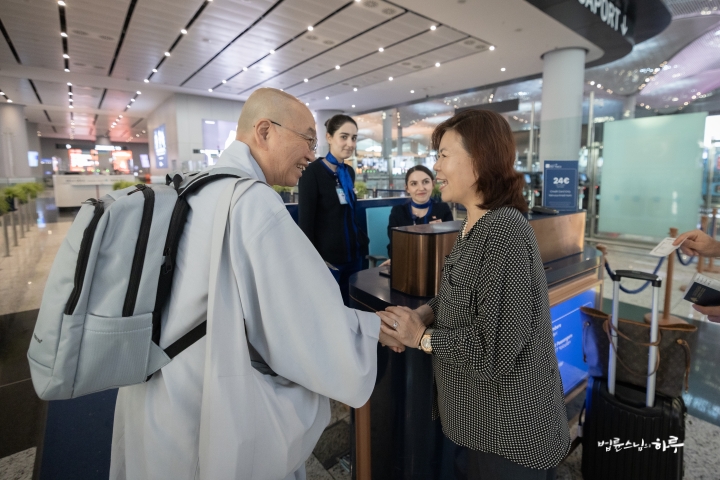
Sunim asked her to ensure thorough preparation for the earthquake recovery project and the school completion ceremony, then boarded the plane to Delhi, India.
The plane departed from Istanbul Airport at 8 PM and is scheduled to arrive at Delhi Airport at 5 AM local time tomorrow after a 6-hour and 30-minute flight. On the plane, Sunim proofread manuscripts before going to sleep.
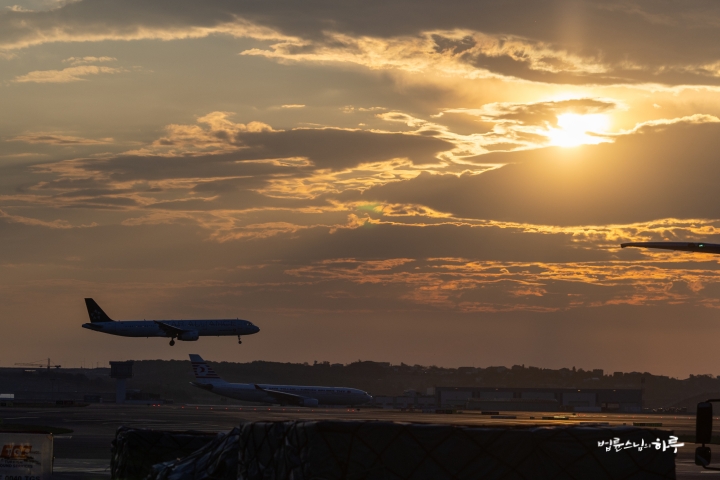
Tomorrow, Sunim will depart from Delhi Airport, fly to Paro Airport in Bhutan, and then drive for 7 hours to reach Trongsa. In Bhutan, a JTS workshop on sustainable development will be held with the participation of village leaders from all five gewogs.




